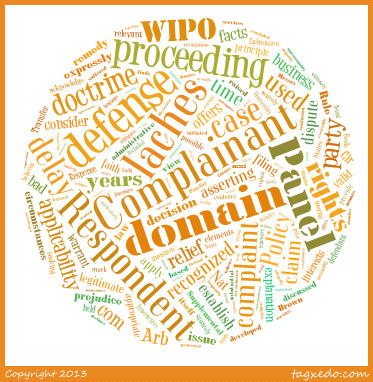Domain Name Disputes – Does delay defeat UDRP?

By Emily Taylor
There was a lot of fuss on the geek newswires the other day as a UDRP provider, the National Arbitration Forum delivered a decision on laches. In that case, the panel dismissed a complaint solely on the basis of the complainant’s delay, and did not even consider the case on the merits. That’s likely to rattle a number of complainants and their representatives, because it was such a clear cut statement of the impact of delay:
Respondent has raised the issue of laches as a defense to the Complaint. Because the Panel agrees, the Panel finds it unnecessary to consider the three elements of the Policy
What’s laches? It’s a concept from the law of equity. For those unhappy enough to remember days of vague bafflement in Trusts & Equity at law school, it’s one of those equitable maxims: “Delay defeats equity”.
Many practitioners still think of domain names as new, when compared with trademarks. But the truth is that some domain name registrations have now been around for 15 years or more, a length of time which would crash up against offline statutes of limitation.
The UDRP and most equivalent processes are silent on limitation, or the effect of delay. An exception is the New Zealand process, which fixes a hard limitation of 3 years:
In making their decision, the Expert shall not take into account any evidence of acts or omissions amounting to unfair registration or use which occurred more than three (3) years before the date of the Complaint.
This is quite harsh, as it’s not even from the date of the Complainant’s knowledge, and there is no flexibility built in to the wording. In practice, this limitation is applied by the New Zealand experts.
What about Domain Name Disputes?
Laches has been raised several times. A good overview is in the Craig’s List case. In 2010, a NAF panel held that laches could be a valid defense in a domain name dispute, and recognised that delay can make it more difficult for the Complainant to establish its case on the merits. However, a WIPO panel in the same year declined to adopt this approach.
As noted above, the Policy offers a limited remedy to avoid future confusion in the marketplace, and it does not contemplate that such a remedy would be unavailable because of delay in instituting a Policy proceeding.
Nevertheless, the same panel observed that “lengthy delays in seeking legal or administrative remedies can often have the effect of eroding or undermining the complainant’s arguments“.
The WIPO Overview (published in 2011 to give guidance to parties to help them navigate the sometimes inconsistent application of the UDRP by panellists), whilst saying that panels have found that the doctrine of laches does not generally apply in the UDRP where the principal concern is to avoid ongoing or future confusion, also makes the same practical point – delay in bringing proceedings can cause difficulties for complainants in establishing their case.
Pulling together the conflicting messages:
- The issue of delay has still not settled down – different panels can adopt different approaches, and that inconsistency increases litigation risk.
- Long delays in bringing a UDRP can add an unnecessary risk of failure in an otherwise strong case.
- Whilst panels may hesitate to adopt laches formally, cases show that delay can make life difficult for a complainant in proving key elements, like the respondent’s lack of rights or legitimate interests, or that the domain was registered for the primary purpose of sale to the complainant.

